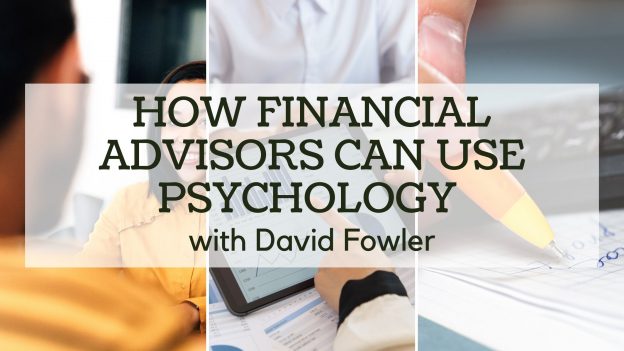The secret tool to success as an advisor is one most advisors don’t want to use: financial psychology. Even the word psychology probably draws up images of therapists discussing feelings with their clients in sessions. And if you wanted to do that, you would have gone to school to be a psychologist.
Luckily, financial psychology doesn’t have to be that involved. With the right tools, strategies, and mindset, you can utilize financial psychology to make better wealth allocation decisions based on your clients’ specific needs.
To learn more, we sat down with David Fowler, an independent fee-only advisor and the founder of High Mountain Financial Coaching. He is a CFP®, a ChFC®, and has been in the business for 16 years. David started in financial services in 2006 with a large, easily recognized financial services company. In 2008, he decided to go out on his own on the insurance side. After a few years, he felt he could better serve my clients while reducing potential conflicts of interest by being fee-only advising practice (no longer selling any commission based products). In January of 2021, he started his fee-only independent investment advisory and financial planning firm, High Mountain Financial Coaching.
What does financial psychology mean to you?
When I hear the term financial psychology my thoughts immediately turn to the field of behavioral finance. As human beings we are wired successfully for survival, but not so great for investing! Interestingly the instincts, behaviors and biases that humans developed to help us thrive as a species are the very things that make us lousy investors. Survival mechanisms such as fear and greed that once helped us to run from a predator or gorge ourselves on a berry patch don’t translate well to our ability to stand firm in the face of the whipsaws of financial markets.
How does your clients’ psychology impact your advising relationship and their financial decisions?
One of the best things an advisor can do for a client is to help him or her become more aware of the very real danger of our innate psychology and its potential to destroy one’s wealth – thereby hampering our ability to achieve our hopes, dreams and goals for the future. One of our primary objectives as an advisor should be to educate our clients and help them see the very real danger we pose to ourselves and our portfolio’s success. Managing behavior successfully leads to managing money successfully.
What strategies do you use to navigate your clients’ different personalities?
There are two main pieces of the puzzle to how we work with our clients to help manage their behavior.
First – the investment strategies we use are built with strict adherence to Nobel Prize winning academic research in the field of investing. We help our clients to select a portfolio where we seek to maximize their potential return while ensuring they take on no more risk than they are able to handle.
Once we have assisted our clients in choosing a portfolio where they are comfortable with the risk/reward profile – the next step is education. Ultimately we want our clients to understand why the portfolios are structured the way they are, have some knowledge of the underlying academics, and have their eyes opened to some of the cognitive biases and blind spots that typically cause investors problems. We hold regular education events and workshops where we seek to over time increase our clients knowledge and confidence.
Ultimately with these two pieces we seek to empower our clients to enjoy the rewards that come with a lifetime of disciplined investing.
Is there anything specific advisors can do to help manage their own financial psychology?
When I was in high school I was an athlete, and my favorite sport was wrestling. My coach impressed upon me the concept of leading by example. He would do everything we did during the workouts, side by side with us. He always said ‘Never ask anyone to do something you aren’t willing to do.’
While it is vitally important for clients to have coaching from their advisors to manage their behavior (because they are human and make mistakes on their own), it is equally important for advisors to have coaching to manage their behavior (because advisors are human too!). Just as we act as a safeguard against our clients destructive behavior, High Mountain Financial gets coaching from Matson Money, Inc. to ensure we stay disciplined. They have our backs, and we have our clients’ backs.
On a side note – if an investor discovers their advisor doesn’t have any guardrails in place on their own behavior – that could be a red flag worth considering…
What is the best piece of advice you could give about getting new clients as an advisor?
The best piece of advice I have for getting new clients is just as our clients thoughts and emotions are the biggest obstacle to their long-term success, an advisor’s thoughts and emotions are the biggest obstacle to gaining new clients. Fear of rejection, fear of failure, and our perception of self-worth all can hamper our ability to grow our practices. The space between our ears is both the key and the obstacle to getting new clients.
Takeaway
At the end of the day, understanding your clients’ financial psychology comes down to managing their expectations and understanding their specific financial goals so you can best allocate their resources. Your advising practice should be about serving your clients in the best way for them with tools like Moneymax, not using cookie cutter financial advice.
